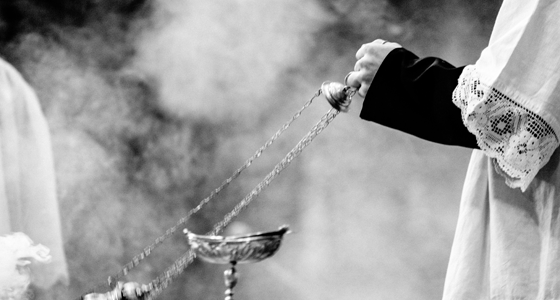Rising Like Incense to Heaven

In the weeks leading up to my reception into the Catholic Church, I prepared to not only to be baptized, but also to be confirmed. The sacrament of baptism uses water to communicate grace that takes away sin, while the sacrament of confirmation uses hands that spread oil across the forehead. This oil seals the person with the gifts of the Holy Spirit to help him live out the Catholic faith. Hebrews 6:2 alludes to this sacrament when it says how, after baptism, we receive “the laying on of hands.”
In some churches confirmation candidates choose a new name for the ceremony, which is usually the name of a saint who prays for that person. A lot of people pick a saint they can identify with, so, since I used to be someone who mocked the Christian faith but now enjoyed defending it, I chose St. Paul. He was, of course, a Jewish leader who used to kill Christians, but after an encounter with the risen Jesus, he became one of the Faith’s greatest defenders (Phil. 3:3-11).
At the end of our preparation class, one of the older volunteers said to me, “You chose Paul as your confirmation name? Those are pretty big shoes to fill.” I wanted to say “I’ve got big feet!” but instead I humbly admitted, “I know, that’s why I need his prayers.”
Many non-Catholics struggle with the concept of praying to saints because they think prayer and worship are the same thing. Since the Bible says we should only worship God, then shouldn’t we only pray to God? But the word “worship” refers to giving someone “worth-ship,” or the honor that person is due. We call judges “your honor,” for example, as a way of paying them respect, but we don’t treat them like gods.
“Prayer” comes from the Latin wordprecariusand refers to making a request for something. In Old English a person might have said to a friend, “I pray you will join us for dinner tomorrow night.” They aren’t worshipping their friend as a god, but simply making a request of them. Catholics do the same thing when they pray to saints; they don’t honor them as gods but ask them for their prayers.
Why should we ask saints in heaven to pray for us when we can just pray to God instead? After all, 1 Timothy 2:5, says, “For there is one God, and there is one mediator between God and men, Christ Jesus.” Catholics agree that it is great to pray to directly to God, but if this argument were taken to its logical conclusion, then it would forbid asking anyone on earth to pray for us.
After all, why ask a friend on earth to pray for you when you can go directly to God? Of course, St. Paul encouraged Christians to pray for everyone (1 Tim. 2:1-4), so 1 Timothy 2:5 must mean that Christ is our one mediator of redemption. Jesus Christ is the only person who unites man and God to one another and removes the barrier of sin between them. But Christ’s unique role as our redeemer does not prevent us from mediating or interceding for one another—either in this life or the next one.
All Christians are united to one another because we are all members of the one body of Christ. Romans 12:5 says, “We, though many, are one body in Christ, and individually members one of another.” If the saints in heaven are Christians, then they must belong to the same body of Christ to which all other Christians belong. This means Christians in heaven are united in the bond of love with Christians on earth, and so there is nothing wrong with asking them to pray for us.
It doesn’t make sense to say Christians who are in heaven are some kind of “amputated” part of Christ’s body that cannot pray for any of the other parts. Jesus calls himself the vine and says we are the branches (John 15:5). If Jesus holds the “keys of Death” (Rev. 1:18), then how could death ever completely separate the branches from one another as long as they are all spiritually connected to the same vine?
Jesus himself said that God “is not the God of the dead, but of the living,” and reminded his Jewish audience that the Father said, “I am [not “I was”] the God of Abraham, and the God of Isaac, and the God of Jacob” (Mark 12:26-27). In the time of Christ (as well as the time of Moses), the Father was still the God of Jewish heroes like Abraham, who had died centuries earlier. To write off saints like them as being “dead” ignores the fact that, by virtue of their heavenly union with Christ, they are more alive than they were on earth.
This excerpt is just a small part of the information you'll find in Why We're Catholic.
Recent Posts
-
Are We Superior to the Early Christians?
If the early Church was the Catholic Church, why can’t we say that Christians just lost their way ea …Jul 15th 2024 -
Did the Early Christians Get Things Wrong?
You can find countless variations of the claim that early Christians believed Protestant things: …Jul 1st 2024 -
How to Respond When the World Tells Us We Can "Build Our Own Deity"
The necessity of revelation and of knowing God on his terms is not accepted in our culture today. A …Jun 22nd 2024









